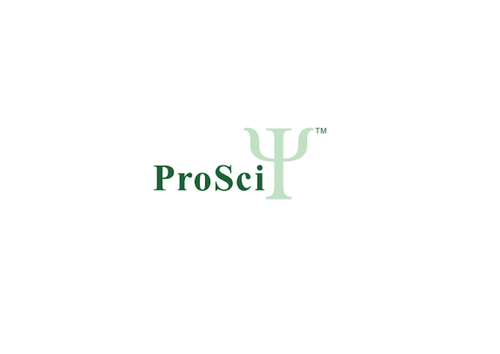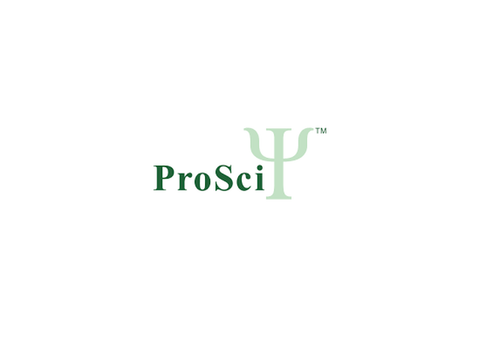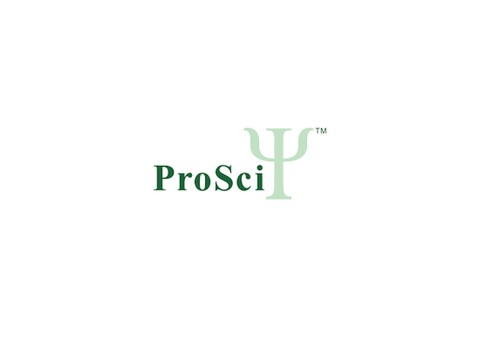Product Description
IL-7 Antibody [NYR-hi7] | XP-5705-M | ProSci
Host: Mouse
Reactivity: Human
Homology: N/A
Immunogen: The monoclonal antibody was produced in BALB/c x C57BL/6 F1 mice using recombinant hIL-7 as the immunizing antigen.
Research Area: Immunology, Chemokines & Cytokines, Functional Assays
Tested Application: E, WB, Neut
Application: Neutralization:
To yield one-half maximal inhibition [ND50] of the biological activity of hIL 7 (0.5 ng/mL) , a concentration of 0.05-0.08 μg/mL of this antibody is required.
ELISA:
In a sandwich ELISA (assuming 100 μL/well) , a concentration of 2.0-4.0 μg/mL of this antibody will detect at least 1000 pg/mL of recombinant human IL-7 when used with our biotinylated antigen affinity purified anti-human IL-7 (XP-5197Bt) as the detection antibody at a concentration of approximately 0.5-1.0 μg/mL.
Western Blot:
To detect hIL-7 by Western Blot analysis this antibody can be used at a concentration of 1.0-2.0 μg/mL. Used in conjunction with compatible secondary reagents the detection limit for recombinant hIL-7 is 2.0-4.0 ng/lane, under reducing conditions and 0.25-0.50 ng/lane, under non-reducing conditions.
Specificiy: N/A
Positive Control 1: N/A
Positive Control 2: N/A
Positive Control 3: N/A
Positive Control 4: N/A
Positive Control 5: N/A
Positive Control 6: N/A
Molecular Weight: N/A
Validation: N/A
Isoform: N/A
Purification: This IgG1 antibody was purified from ascites fluid on a Protein A affinity column.
Clonality: Monoclonal
Clone: NYR-hi7
Isotype: N/A
Conjugate: Unconjugated
Physical State: Lyophilized
Buffer: N/A
Concentration: N/A
Storage Condition: IL-7 lyophilized antibody is stable at room temperature for at least one month and for greater than a year when kept at -20˚C. Reconstitute in sterile water to a concentration of 0.1 - 1.0 mg/mL. The antibody is stable for at least six weeks at 2-4˚C when reconstituted.
Alternate Name: Interleukin 7Interleukin-7IL-7, IL-7
User Note: Centrifuge vial prior to opening.
BACKGROUND: Iterleukin 7 is a lymphoid cell growth factor that affects pre-B, pro-B, and early T cells. IL-7 was previously known as pre-B cell growth factor and lymphopoietin 1. IL-7 supports the growth of early B cells from long-term lymphoid bone marrow cultures. It is mitogenic to thymocytes and enhances the response of cells to other stimuli such as polyhydroxyalkanoate (PHA) and concanavalin A (ConA) . IL-7 stimulates the proliferation of CD4+/CD8+ cells. The proliferative response of thymocytes to IL-7 is not affected by antibodies to the T cell growth factors such as IL-2, IL-4 and IL-6, suggesting that IL-7 is capable of stimulating T cell proliferation through a pathway independent of the known T cell growth factors. Mature T cells respond to IL-7 and Con A, but not to IL-7 alone. In myeloid lineage cells, IL-7 upregulates the production of pro-inflammatory cytokines and stimulates the tumoricidal activity of monocytes/macrophages. IL-7 is expressed by adherent stromal cells from various tissues.
 Euro
Euro
 USD
USD
 British Pound
British Pound
 NULL
NULL

![IL-7 Antibody [NYR-hi7] IL-7 Antibody [NYR-hi7]](https://cdn11.bigcommerce.com/s-452hpg8iuh/images/stencil/1280x1280/products/555195/764067/porsci_lo__79508.1648973713__30560.1649086593.png?c=2)
![IL-7 Antibody [NYR-hi7] IL-7 Antibody [NYR-hi7]](https://cdn11.bigcommerce.com/s-452hpg8iuh/images/stencil/100x100/products/555195/764067/porsci_lo__79508.1648973713__30560.1649086593.png?c=2)
![IL-7 Antibody [NYR-hi7] IL-7 Antibody [NYR-hi7]](https://cdn11.bigcommerce.com/s-452hpg8iuh/images/stencil/500x659/products/555195/764067/porsci_lo__79508.1648973713__30560.1649086593.png?c=2)


![IL-11 Antibody [27B1047.1] IL-11 Antibody [27B1047.1]](https://cdn11.bigcommerce.com/s-452hpg8iuh/images/stencil/500x659/products/555197/764069/porsci_lo__79508.1648973713__41108.1649086593.png?c=2)

![IL-15 Antibody [PEPY024_hIL-15] IL-15 Antibody [PEPY024_hIL-15]](https://cdn11.bigcommerce.com/s-452hpg8iuh/images/stencil/500x659/products/555198/764072/porsci_lo__79508.1648973713__24236.1649086593.png?c=2)